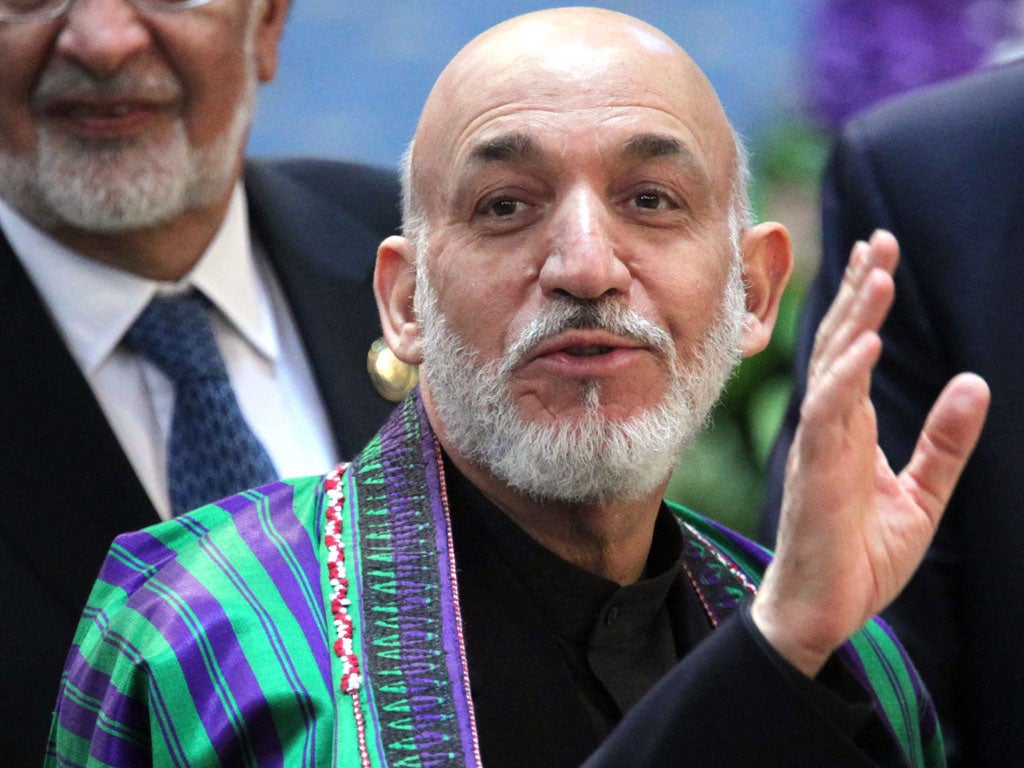Controversial plan to split up Afghanistan
A Tory MP proposes dividing the country into zones, some of which could involve the Taliban

Your support helps us to tell the story
From reproductive rights to climate change to Big Tech, The Independent is on the ground when the story is developing. Whether it's investigating the financials of Elon Musk's pro-Trump PAC or producing our latest documentary, 'The A Word', which shines a light on the American women fighting for reproductive rights, we know how important it is to parse out the facts from the messaging.
At such a critical moment in US history, we need reporters on the ground. Your donation allows us to keep sending journalists to speak to both sides of the story.
The Independent is trusted by Americans across the entire political spectrum. And unlike many other quality news outlets, we choose not to lock Americans out of our reporting and analysis with paywalls. We believe quality journalism should be available to everyone, paid for by those who can afford it.
Your support makes all the difference.Afghanistan could be carved into eight regional zones – with some of them potentially ruled by the Taliban – according to a controversial plan under discussion in London and Washington.
Code-named "Plan C", the radical blueprint for the future of Afghanistan sets out reforms that would relegate President Hamid Karzai to a figurehead role.
Devised by the Conservative MP and Foreign Office aide Tobias Ellwood in 2011 (when he was Permanent Private Secretary to the then Defence Secretary, Liam Fox), it warns that the country faces a "bleak" future when it is left to fend for itself. Mr Ellwood claims that a "regionalised" state under a powerful new prime minister would tackle the weak government, tribal disputes and corruption which many fear could plunge Afghanistan into chaos when the International Security Assistance Force (Isaf) withdraws at the end of 2014.
Senior government sources confirmed that Plan C – Finding a political solution to Afghanistan had been presented to the Foreign Secretary, William Hague, and discussed with officials at the White House. Mr Ellwood, a former captain in the Royal Green Jackets, has also discussed the plan with Pakistani government officials in London.
But experts criticised the attempt to "impose" a democratic system on Afghanistan, and insisted that coalition leaders should be concentrating on a military exit strategy that would enable them to withdraw their forces by the 2014 deadline.
Wazhma Frogh, executive director of Afghanistan's Research Institute for Women, Peace and Security, said: "Who is the British MP sitting in London and deciding for Afghanistan? It should be us, the people of this country, deciding if we want to divide into states or collapse as a nation. I am surprised to see an MP of a democratic country creating the future and showing solutions for a country in which he doesn't have to live and where his children will not have to live."
Mr Ellwood, who now works as a parliamentary aide to the Foreign Office minister David Lidington, claimed a political settlement – even one that includes the Taliban – was necessary to guarantee Afghanistan's long-term stability.
"Isaf may be confident that its revised security strategy is finally working, but the insurgent threat will not be removed by force alone," he said in the report, seen by The Independent on Sunday. "The Taliban will not enter into a meaningful dialogue if there is no feasible political strategy within which they can participate... An alternative solution [offers] a less centralised political structure that better reflects the ethnic make-up of the country, the already established economic hubs and the regional interest of the Taliban, who might then be encouraged towards a political settlement."
The plan divides Afghanistan into eight zones, based around the "economic hubs" of Kabul, Kandahar, Herat, Mazar-i-Sharif, Kunduz, Jalalabad, Khost and Bamyan. The areas would be administered by a council representing different ethnic groups and overseen by one or more foreign countries. Mr Ellwood also claims that creating a post of prime minister, with many of the "disproportionate" powers currently held by the President, would help allay concerns over the man who has been in charge of the country for almost eight years.
But Thomas Ruttig, co-director of the Afghanistan Analysts Network, said: "Splitting the country into such regions will result in the empowerment of what we have started calling 'local (or regional) power brokers' and what was known as 'warlords' before, whose misrule between 1992 and 1996 caused the rise of the Taliban in the first place."
Join our commenting forum
Join thought-provoking conversations, follow other Independent readers and see their replies
Comments